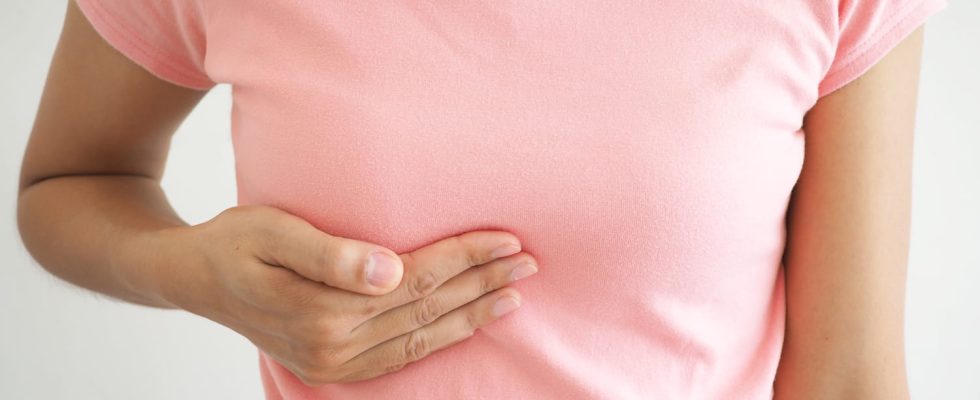A cyst in the breast (mammary cyst) is most of the time benign and does not increase the risk of cancer. However, it can be bothersome and cause symptoms such as pain.
What is a breast cyst?
A cyst is a cavity in which fluid is lodged produced by the mammary glands. Depending on the importance of the quantity of this liquid, the cyst will have a different size: from a few millimeters to several centimeters. It can be from round or oval mass and roll under the fingers during palpation. They can appear on only one breast or both. “Breast cysts are more likely to affect women during periods of genital activity.“, indicates Dr Odile Bagot, gynecologist.
What causes a breast cyst?
Breast cysts are most often linked to an imbalance in the hormones of the menstrual cycle. There are several risk factors identified.
Breast cysts seem to be more common in:
- Women between the ages of 35 and 50 (perimenopause)
- Patients on hormone replacement therapy for menopause
- People who smoke
- Women who had a pregnancy after the age of 30
- Patients who have never had children
- Women who got their period very early
What are the symptoms of a breast cyst?
“Breast cysts are usually painless and only discovered incidentally, except when under tension“, specifies Dr. Bagot. The symptoms can be the following:
- A mass, often mobile more or less tense
- A mass that grows and hardens approaching menstruation and during menstruation.
Why is a breast cyst sometimes painful?
At the approach of the rules and during this period, cysts naturally tend to grow, harden, and become more painful. “Everything will usually be back to normal at the end of the period, explains Dr. Bagot. However, sometimes large cysts do not regress with menstruation and remain under tension“.
Why is breast cyst hard?
At the time of the rules, the cysts are more tense it is normal. But outside this period, if you feel a hard lump under your fingers, consult your doctor to establish a diagnosis.
When to consult?
Any appearance of a mass in the breasts, painful or not, should prompt you to consult your doctor or gynecologist. This will proceed to a clinical breast exam and, if necessary, will prescribe a breast ultrasound and/or mammogram. Depending on the results, a biopsy will complete the protocol.
When to do a puncture?
A breast cyst often disappears naturally. Otherwise or if it is large, it is possible to remove the liquid contained in the cavity by puncture using a needle, under ultrasound control. But the cyst can come back. In this case, another puncture is considered. If this happens too frequently or if there is a risk of cancer, the surgical option may be considered to permanently remove the bothersome cyst.
What are the treatments for a breast cyst?
Progestogel is a medicine that comes in the form of a progesterone-based gel. It is applied topically to treat benign breast conditions such as pain, swelling or cysts. It is to be put several times a day, including during menstruation. In massage, evening primrose oil helps to reduce breast tension.
Breast cyst after menopause: normal or not?
After menopause, it is very rare for breast cysts to occur, except in the case of hormone replacement therapy.
Thanks to Dr Odile Bagot, gynecologist.

